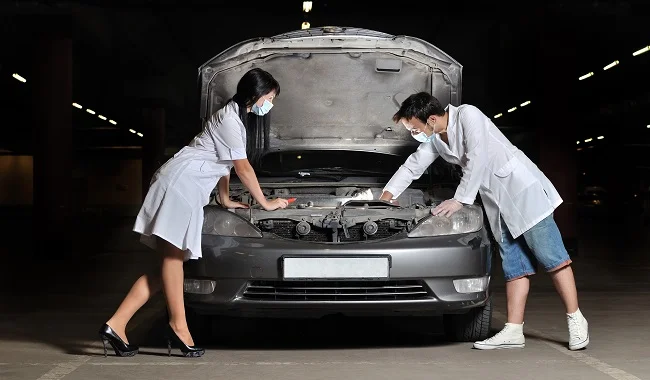When it comes to European cars, their sleek designs, refined engineering, and superior performance often make them stand out on the road. However, owning a European vehicle also comes with the responsibility of maintaining it properly to keep that premium driving experience intact. From Audi to BMW, Mercedes-Benz to Volkswagen, European auto repair requires specialized knowledge that goes beyond your typical maintenance check.
This blog will explore what makes European car repairs different, the unique needs of these vehicles, and how to choose the right repair shop to ensure your investment is protected. Whether you’re a proud owner of a high-performance sports car or a luxurious sedan, this guide will help you stay informed.
What Makes European Auto Repair Different?
European vehicles are known for their cutting-edge technology, intricate components, and high manufacturing standards. However, this sophistication means that repairs are often more complex than those for standard domestic or Japanese cars. Here’s why:
1. Advanced Engineering Features
European automakers are pioneers of advanced engineering and design. Features like turbocharged engines, dual-clutch transmissions, and adaptive suspensions are far more common in European cars. While this gives drivers an exceptional experience, it also means repairs require technicians who understand these systems in-depth.
2. Specialized Parts
European vehicles often use premium, high-performance parts, many of which are not readily available or interchangeable with generic alternatives. For instance, parts for BMWs or Audis often need to be imported, increasing the cost and repair time.
3. Unique Diagnostic Systems
Unlike most vehicles, which use fairly standard OBD-II (On-Board Diagnostics) scanners, European models often require specific manufacturer-level diagnostic tools. These tools allow technicians to access specialized codes and features to properly diagnose any issues.
Common Repairs for European Cars
Every vehicle requires maintenance, but some repairs are more common with European models. Here are a few to keep an eye out for:
1. Electrical System Repairs
European cars come loaded with advanced technologies and high-end electrical systems. Whether it’s faulty wiring, sensor malfunctions, or issues with the infotainment system, electrical repairs are one of the most common types for these vehicles.
2. Suspension Problems
European cars, especially luxury ones, are often equipped with sophisticated suspension systems designed for comfort and handling. Over time, components like control arms, ball joints, or air suspension systems may need replacement or repair.
3. Turbocharger Wear
Many European models, particularly BMW and Audi vehicles, rely on turbocharged engines for their performance edge. Turbochargers, while powerful, endure high levels of pressure and heat, making them prone to wear over time.
4. Brake System Maintenance
Braking systems in European cars, such as high-performance Brembo brakes, are often more advanced than those in other vehicles. Routine brake maintenance, such as pad and rotor replacements, is critical to maintain safety and performance.
5. Transmission Issues
Luxury sedans and performance cars often feature dual-clutch or automatic transmissions. These systems, while efficient, can require specialized maintenance due to their complexity.
Why Professional Expertise Matters
Trying to save a few dollars by opting for a general auto repair shop can actually cost you more in the long run. Here’s why choosing a European auto repair specialist is crucial:
1. Manufacturer-Specific Knowledge
Experts trained in European vehicles are familiar with the brand-specific requirements of each make and model. Whether it’s knowing a VW needs a specific type of synthetic oil or understanding the quirks of a Mercedes-Benz air ride suspension, specialized knowledge makes a difference.
2. Access to Genuine Parts
A reliable European auto repair shop sources original equipment manufacturer (OEM) parts, ensuring that your car maintains its performance and value. Generic parts may not provide the same quality or longevity.
3. Sophisticated Diagnostic Tools
Professionals who specialize in European cars invest in advanced, brand-specific diagnostic tools that allow for precise troubleshooting and repair. This saves both time and money by identifying issues accurately the first time.
How to Choose the Right European Auto Repair Shop
Not all repair shops are created equal, especially when it comes to European cars. Here’s what to look for in a repair facility:
1. Certifications and Training
Check that the technicians are certified and have experience working with European brands. Look for ASE (Automotive Service Excellence) or manufacturer-specific certifications that indicate expertise.
2. Customer Reviews
Online reviews can offer valuable insights into the quality of service. Look for feedback from other European car owners to ensure the shop has a strong track record.
3. Warranty on Repairs
A reputable shop will stand by their work. Opt for a facility that offers warranties on parts and labor, giving you peace of mind.
4. Specialized Equipment
Make sure the shop is equipped with brand-specific diagnostic tools and equipment to handle the unique needs of your car.
5. Transparent Pricing
Avoid shops that offer vague pricing. A reliable service provider will provide a clear estimate before starting repairs, so you know exactly what to expect.
Tips for Maintaining Your European Car
While some repairs are inevitable, regular maintenance can help reduce breakdowns and extend the life of your vehicle. Here’s how to keep your European car performing at its best:
- Follow the Service Schedule: Adhere to the manufacturer’s recommended service intervals to prevent costly issues down the line.
- Use Premium Fluids: European vehicles often require specialized oils, coolants, and transmission fluids. Stick to the recommended options.
- Monitor Warning Lights: Don’t ignore warning lights. Consult a professional as soon as an issue arises to prevent further damage.
- Keep It Clean: Regularly washing and waxing your car not only keeps it looking great but also protects the paint and prevents rust.
- Store It Properly: If you’re not driving your car for extended periods, store it in a climate-controlled space and consider using a battery maintainer.
The Cost of Owning a European Car
It’s no secret that owning a European auto repair can be more expensive when it comes to upkeep. The key is accepting that this investment comes with added responsibility. By staying proactive with maintenance and repairs, you can enjoy the unparalleled experience these cars offer while keeping costs manageable.
Keep Your European Ride Road-Ready
European cars are a masterpiece of design and engineering, but they demand the right care to maintain their performance and charm. By understanding the common repair needs and committing to regular maintenance with a trusted European auto repair specialist, you’ll keep your vehicle running smoothly for years to come.
If you’re struggling to find the right repair shop or need expert advice, reach out to a certified European automotive specialist today. With the right support, you can drive with confidence, knowing your car is in excellent hands.































